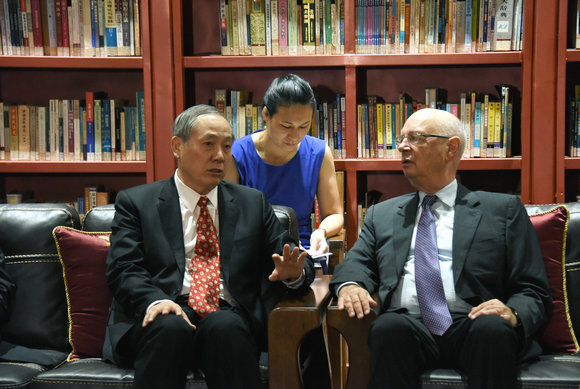Source: Office of International Cooperation & Exchange
Written by: Office of International Cooperation & Exchange
Proofread by: Ian Heuer
Edited by: Wang Dongmei
On the morning of June 23, 2016, Professor Klaus Schwab, Founder and Executive Chairman of the World Economic Forum (WEF), led a delegation of four people on a visit to Sun Yat-sen University (SYSU). Mr. Ren Xuefeng, Secretary of the CPC Guangzhou Municipal Committee, and Mr. Pan Jianguo, Secretary-General of the CPC Guangzhou Municipal Committee, represented the Guangzhou municipality at the meeting, and were joined by SYSU representatives Professor Chen Chunsheng, Secretary of SYSU Party Committee, and Professor Luo Jun, President of SYSU. The meeting took place in the SYSU Library on the Guangzhou South Campus and also included Professor Wei Minghai, Vice President of SYSU, along with representatives from the President’s Office, the Office of International Cooperation and Exchange, Lingnan College, and other SYSU departments.
Professor Chen Chunsheng meeting with Professor Klaus Schwab

Professor Luo Jun meeting with Professor Klaus Schwab
On behalf of the entire University, Professor Chen Chunsheng welcomed the delegation to SYSU. Professor Luo Jun introduced the guests to SYSU’s history, campus construction, development plan, and to the state of cooperation between Guangzhou and SYSU, among other topics. He also mentioned that he looks forward to building closer ties between the WEF and SYSU, thereby creating new platforms for academic cooperation and exchange.
Professor Schwab expressed his gratitude toward Guangzhou and SYSU for hosting the reception and mentioned that he was happy to be able to visit such an esteemed university. He noted that the WEF plays host to a broad network of universities and education institutions, and he looks forward to adding SYSU into this network and increasing Guangzhou’s level of participation in WEF activities.
Professor Schwab also used his time at SYSU to present a speech on the “Fourth Industrial Revolution” and engage in a participatory dialogue with the audience of collected students and faculty members. According to Professor Schwab’s theory, the Fourth Industrial Revolution has already begun. The key features of this new industrial revolution are the continued informatization of the economy, breakthroughs in artificial intelligence and mobile computing, and further integration of technology into our daily lives. Professor Schwab emphasized that the new revolution is noted for its diversity of innovation and the speed of change, and therefore has the potential to usher in sweeping changes into the way we live our lives. The revolution will lead to an organic synthesis of digital technology, physical technology, and biotechnology, leading to massive repercussions in our economies and societies.
Furthermore, Professor Schwab also mentioned his "stakeholder" theory, the principles of which apply not only to business and government but also to academia. He mentioned that the stakeholders include the students and teachers present at the lecture, who are responsible for the next generation of innovations and global development. After the conclusion of his remarks, the students in the audience were eager to ask questions and engage Professor Schwab in a two-way dialogue about topics such as the challenges and opportunities presented by the Fourth Industrial Revolution, the strengths of Guangdong Province in dealing with these opportunities, and the economic impact of Britain’s withdrawal from the European Union.
Professor Schwab founded the European Management Forum in 1971, which changed its name to the World Economic Forum in 1987. It is also known as the Davos Forum, due to its signature annual summit in Davos, Switzerland. The World Economic Forum is a non-governmental international organization that provides a venue for the study and discussion of the world economic issues and the promotion of international economic cooperation and exchanges. Beginning in 2007, the WEF has held the Annual Meeting of the New Champions (also called Summer Davos) in China. This year, the Summer Davos meeting was held from June 26 to 28 in Tianjin.



